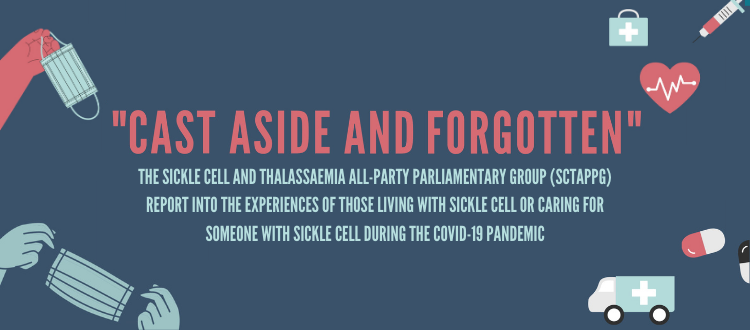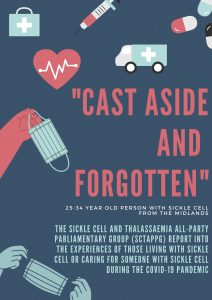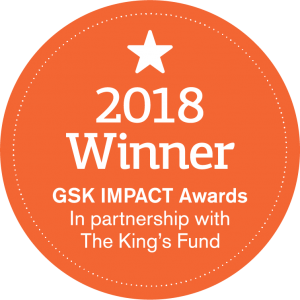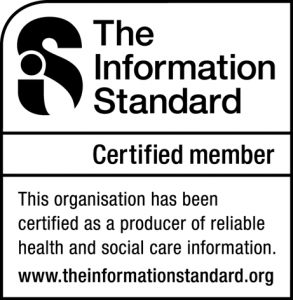Cast Aside and Forgotten – A Report
Cast Aside and Forgotten – A Report
The All-Party Parliamentary Group for Sickle Cell and Thalassaemia publishes a new report into the impact of the COVID-19 pandemic on the sickle cell community.
Cast Aside and Forgotten is the latest report from the Sickle Cell and Thalassaemia All-Party Parliamentary Group (SCTAPPG). Taking its name from a quote by a person living with sickle cell in the midlands, the report investigates the experiences of those living with sickle cell or caring for someone with sickle cell during the COVID-19 pandemic.
The pandemic had an unsteady start for those with sickle cell disease (an inherited blood condition which predominantly affects people from African and Caribbean backgrounds) when the NHS’s people at high risk (clinically extremely vulnerable) list included Homozygous sickle cell disease but failed to include other genotypes of sickle cell disease. After this oversight was rectified, it was then discovered through countless anecdotal accounts that those with sickle cell trait were being told erroneously they were also being classed as clinically extremely vulnerable. These two incidents failed to reassure the sickle cell community, and hence the Sickle Cell Society (SCS) knew it was crucial that more must be done by those outside central government to safeguard those living with sickle cell disease.
The SCS looked to stem this outpouring of anxiety by providing expert advice and support through the plethora of services it offers, whether that’s through its helpline which was inundated with queries, or its website providing the most up-to-date guidance.
The SCTAPPG then worked with the SCS to commission a survey into the ramifications that coronavirus would have on the sickle cell community and their primary caregivers. The survey was launched on 28th of May 2020 and disseminated through the SCS membership, as well as through patient groups and clinical networks.
Amongst a host of objectives, the survey aimed to collect data to determine whether those living with sickle cell or caring for someone with sickle cell disease are receiving all the information required, and whether the government guidance is suitable for their circumstance.
The report aims to highlight the prevailing issues that are affecting the sickle cell community during this pandemic as well as, in respondents’ own words, offering an insight into the reality of living day-to-day during the government lockdown.
It also seeks to examine this COVID-19 pandemic through the lens of the structural injustices that exist which have only served to exacerbate the plight of people living with sickle cell disease. The key findings have aided the SCTAPPG to be in a position to make a host of substantive policy recommendations in order to ensure the safety of this clinically vulnerable cohort going forward.
Download the full report here: Cast Aside and Forgotten – SCTAPPG Report (Final)
“This report paints a picture of the experience of the pandemic through the eyes of those living with sickle cell. As in other walks of life is shows the need for more understanding of this condition as well as the need for better treatment. I hope the report is read by those who can make a difference in health care, the benefits system and many other walks of life” – Rt Hon Pat McFadden MP (Chair of the SCTAPPG)
Key Survey Findings
50.5% of respondents informed us that the COVID-19 had affected their access to healthcare services in their locality. It is a chilling statistic that just over half of all respondents revealed that their usual health pathways were being disrupted by the pandemic.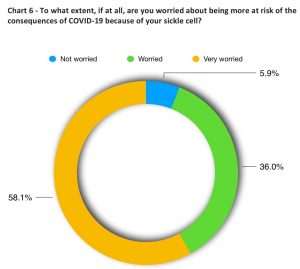
One respondent explained that “outpatient appointments have moved to phone calls, GP appointments cancelled, I have not been able to go to chemists due to shielding, so I had to manage pain for a month while waiting for my next check-up.”
Another said that it was “harder to get prescriptions and also getting medication delivered on time to manage my sickle cell. I have not been able to have regular blood tests to help monitor my condition.”
This failure to access healthcare services will most likely be in direct contradiction of doctors’ orders – who are best placed administer the most effective treatments and provide advice on healthcare needs. There was a general consensus that cancellation of GP service provision/outpatient appointments/annual consultations/ planned surgeries/ planned routine check-up’s/scans is a prevailing issue.
Respondents had an overwhelming sense of fear and trepidation about the future, and how these delays and missed appointments will affect their health outcomes.
One person said: “I’m not sure how I’m going to get a new prescription for Hydroxyurea or any of my other medication. And those not fortunate enough to have support networks having to take the biggest risk of them all and fend for themselves.”
From renal to haematologist appointments, it is apparent there is distress and panic that services users are not being afforded the opportunity to effectively manage their condition by using the host of services they require. The cohort feels a sense of neglect with people lamenting that they have not had a blood test for months. Of those who hadn’t been able to access all their healthcare services, 20.5% of that cohort had reported this had itself brought on a crisis (episodes of severe pain caused when sickle cells stick together, causing blockages in the small blood vessels).
Furthermore, the nature of having to conduct appointments over the phone has resulted in cases whereby service users have felt an inability to be able communicate effectively one’s condition. One person said their “GP refused face to face appointment so I ended up in hospital with severe pneumonia because they didn’t inspect my chest.”
This has people feeling helpless to improve and manage their condition. What’s more, a reliance on support networks to carry out visits to the chemists/pharmacies puts those without those very networks at risk of failing to adhere to medical advice through no fault of their own.
Conclusion
Intrinsically COVID-19 does not discriminate, pandemics don’t choose their victims and a virus does not select its host. But what is safe to say is that in a society where structural inequalities exist whether that be by socio-economic background, race, gender, disability – COVID-19 does discriminate.
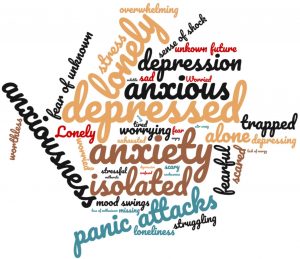
A visual representation of the qualitative evidence given on the subject of mental health reveals a very despondent and dejected cohort
The likelihood of contracting the virus increases or decreases dependent on these aforementioned variables. And though it has not been proved beyond doubt that having sickle cell decreases your chance of survival, your race and socio-economic background have been proven to increase your likelihood of contracting the virus. If you take one of our members who is BAME, has sickle cell and from a lower socio-economic background, they are more likely to suffer from COVID-19.
Consequently, COVID-19 does discriminate, it has served to exacerbate and amplify the health inequalities that already exist.
Download the full report here: Cast Aside and Forgotten – SCTAPPG Report (Final)
Find out more about the SCTAPPG here: www.sicklecellsociety.org/sctappg/

